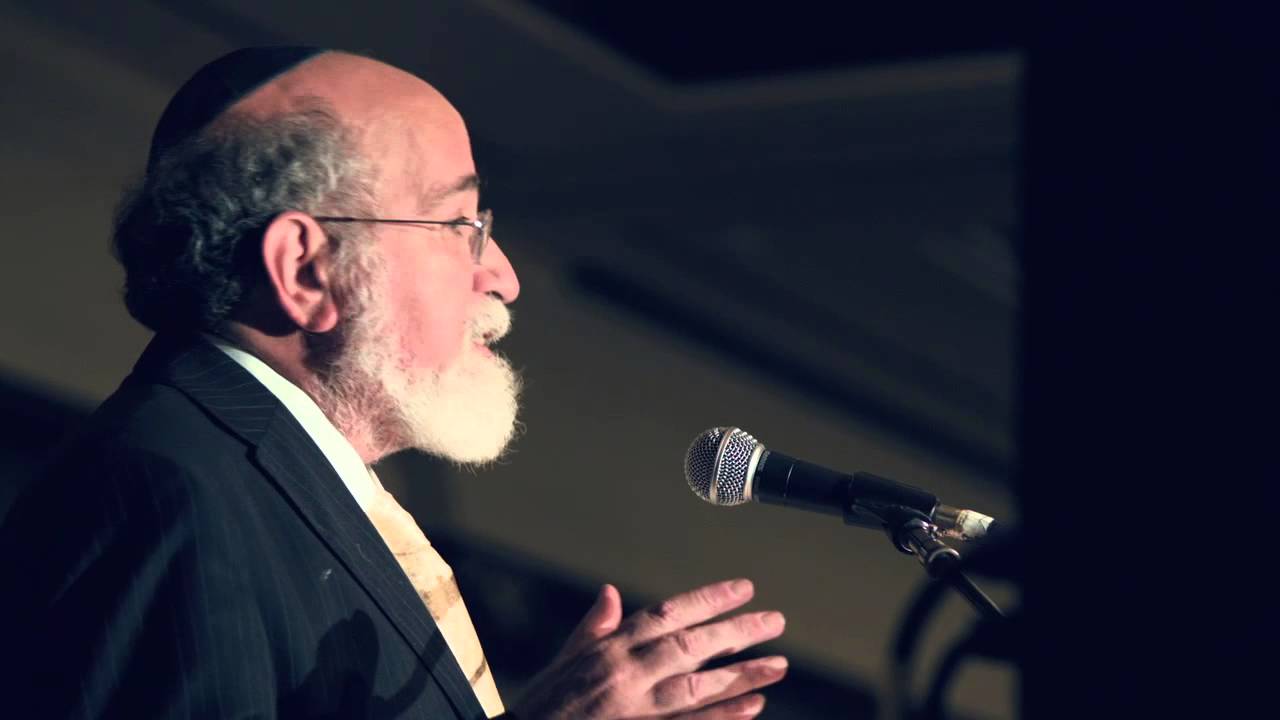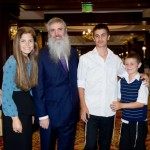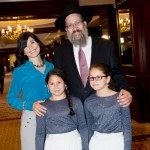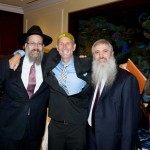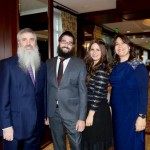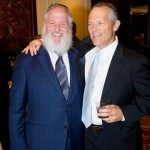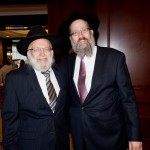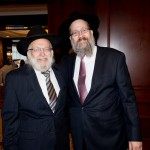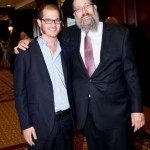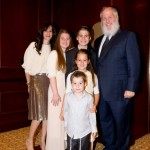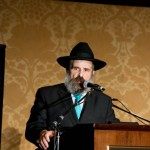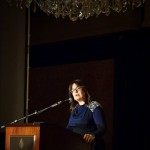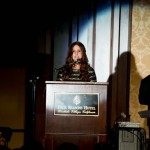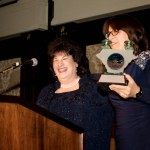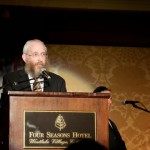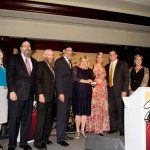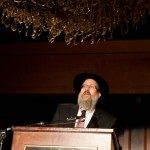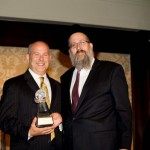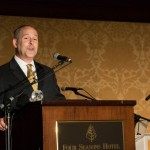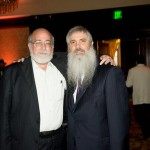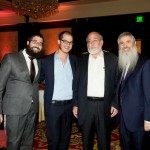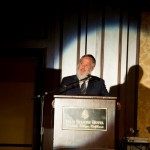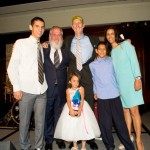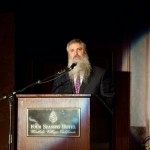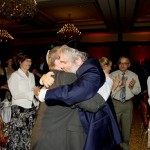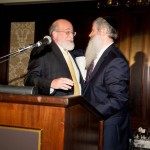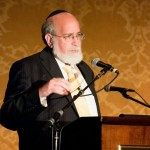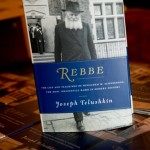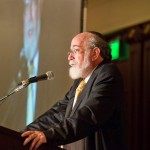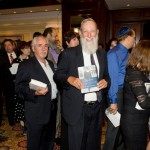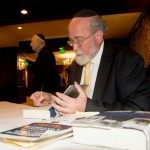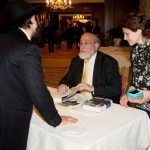In the hours counting down to the midnight release of his highly-praised monumental work on the life and teachings of the Lubavitcher Rebbe, author Rabbi Joseph Telushkin found himself in the company of some 500 friends and supporters of Chabad of the Conejo, who had gathered on Monday, June 9, at the Four Seasons Hotel in Westlake Village, California, to celebrate the organization’s annual Dinner. His riveting keynote address would serve as a fitting climax to an evening centered on the theme “One Person / One World,” reflecting the Rebbe’s repeated emphasis on the infinite value of the individual.
“This ideal of ‘one person / one world’ is not an isolated phenomenon, but an everyday occurrence,” said Rabbi Moshe Bryski, Executive Director of Chabad of the Conejo, after having related a powerful story of how Chabad’s efforts to reach out to a handful of Jews on Chanukah at a shopping center in Simi Valley resulted in literally saving a man’s life and directly affecting the course of future generations. At one point during this recounting, a photograph of the man’s newborn twin grandchildren was flashed on the screen in the banquet-hall.
“Each and every day, each and every one of us is presented with myriad opportunities to touch people’s lives,” said Rabbi Bryski, “perhaps in ways that seem rather simple and unremarkable at the time, but which later prove to have an enormous impact that could not possibly have been foreseen or even imagined.”
In a dramatic and emotionally-charged moment, the man who was the subject of Rabbi Bryski’s story stepped forward and the two interlocked in an extended embrace as the room erupted in a thunderous standing ovation.
Other highlights of the evening included the presentation of the “Champions of the Spirit Award” to the Feldman Family, whose three-year-old child’s brave battle with a rare form of sarcoma had inspired an outpouring of prayer and benevolence described by Rabbi Shlomo Bistritzky as a series of events that “elevated the entire community to a whole new level of spiritual consciousness and solidarity.”
To purchase a copy of Rabbi Joseph Telushkin “Rebbe” please click here.
Mr. Glenn Broder, who received the evening’s “Visionary Award” from Rabbi Yisroel Levine, spoke of how Chabad’s emphasis on unconditional love was a concept he had rarely been exposed to in his younger years while growing up in an orthodox community, and how the discovery of this perspective later in life brought him back to his roots and inspired him to want to share Chabad’s vision and approach with as many others as possible.
A memorial tribute celebrating the legacies of the late Harold & Evelyn Greenberg and Mickey & Faye Berger – parents of Stuart and Carrie Greenberg, prominent lay-leaders in the Chabad of the Conejo community – was presented in poetry form by Rabbi Yitzchak Sapochkinsy. The evening’s “Woman of Valor Award” was presented to Wendy Levenson by Matty Bryski and Chana Kahanov in recognition of her volunteerism as a musician, coordinator and organizer on behalf of Chabad’s various educational and social service programs.
With all of the evening’s presentations demonstrating how actions performed at the micro level can change the world on the macro level, the stage was set for Rabbi Joseph Telushkin’s gripping account of his humbling, yet empowering, 5-year journey of researching and writing about the extraordinary person described in the subtitle of his book as the “Most Influential Rabbi in Modern History.”
“The Rebbe set for himself a goal that no other Jewish leader with whom I am familiar had ever set,” said Rabbi Telushkin in the early part of his address, “and that was to reach every Jewish community and every Jew in the world. It is perhaps no coincidence that all of this occurred in the aftermath of the Holocaust. For, as Rabbi Jonathan Sacks put it: ‘If the Nazis hunted down every Jew in hate, the Rebbe wanted to hunt down every Jew in love.'”
Teslushkin went on to describe the scope of Chabad’s global reach, now spanning 80 countries and 48 (soon to be 49) of the 50 United States – all resulting from the Rebbe’s methodology of leadership, which not only attracted multitudes of followers, but more so, created leaders. He spoke about the Rebbe’s unique optimism, which manifested itself in action and philosophy, and even – and perhaps especially – in the subtlety of language, with the Rebbe always encouraging people to choose only positive means of expression.
In making a point about the Rebbe’s emphasis on the preciousness of time, Rabbi Telushkin spoke about the Rebbe’s sense of urgency and immediacy in getting things done for the benefit of Jewish communities around the world. “The Rebbe’s attitude was that anything worth doing – is worth doing now!” he said.
He spoke of the Rebbe’s efforts to find areas of commonality, even with those with whom he might have otherwise vehemently disagreed with on a wide range of issues. He also spoke about the Rebbe’s recognition of every mitzvah as being virtuous in its own right, irrespective of other areas in which a person may, or may not, be meticulously observant – all of which were part of the Rebbe’s underlying fundamental approach of not being judgmental of others.
Rabbi Telushkin proposed that all of the Rebbe’s inspiration and accomplishments stemmed from the deeply-rooted Jewish ideal of love of neighbor and an extraordinary focus on the individual. Among the many examples he gave of this focus, perhaps the most poignant of all was one relating to his own father, the late Shlomo Telushkin, who, over the course of 40 years, served as an accountant for both the Rebbe and his predecessor, the Previous Rebbe.
He described how when his father was in a coma after having suffered a stroke in 1986, there would be calls from the Rebbe’s office twice a day asking for updates on his father’s condition. These calls would continue even after his father almost miraculously regained consciousness, including one strange call wherein the Rebbe was requesting the elder Telushkin’s advice on an accounting matter. After registering his initial puzzlement at the nature of the Rebbe’s inquiry at a time when his father was so sick and somewhat disoriented, and being told by the Rebbe’s secretary, Rabbi Krinsky, that the Rebbe was well aware of his father’s condition and needed the answer nonetheless, Joseph Telushkin did indeed pass on the question to his father, which he was remarkably able to answer.
It was only later that the younger Telushkin realized what the Rebbe’s motivation had been. “The Rebbe was sitting in his office in Brooklyn with all sorts of major macro issues confronting the Jewish people all over the world, but he was also thinking about my father lying in a hospital bed, feeling that his life had basically come to an end… So the Rebbe came up with a question that my father could answer, and by doing so, gave my father a sense of hope; a sense of purpose.”
While Rabbi Telushkin’s talk was informative and insightful on many levels, if nothing else, it clearly portrayed how “One Person / One World” came to be the central creed of Chabad. “The Rebbe saw each person as being a creation in G-d’s image,” he said, “and when you really believe that, you understand the holiness of every person. And it’s therefore not surprising that you then send out emissaries to the entire world… The Rebbe’s vision was to show people that there are those who love them, and that G-d loves them, and through that love, they could change the whole world… They have done so and they are continuing to do more.”

